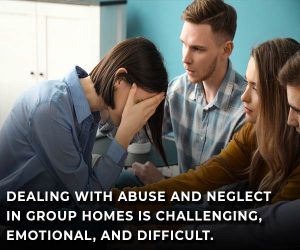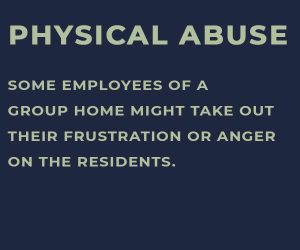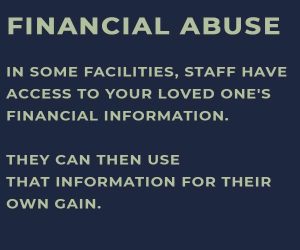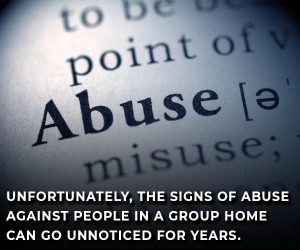GROUP HOME ABUSE CASE SETTLEMENT RESULTS
Dealing with abuse and neglect in group homes is challenging, emotional, and difficult. A group home is meant to provide care for adults who need daily care and support in the state of Maryland. When suspected abuse is reported, it can hurt your family and make you feel overwhelmed or frustrated.

If you suspect that a loved one has experienced abuse in a group home or other welfare facilities, then you need to find a lawyer who has experience working with the victim of abuse in group homes and getting compensation for group home abuse.
At Zirkin & Schmerling, we know how to support you and your family members during this challenging time. We understand how important the case is to help your family get the money they need to cover the emotional and physical damages of group home abuse.
Your well-being is our top priority. We are here to provide comprehensive legal support to help you navigate through these challenging times.
Get a free consultation about your nursing home abuse case today by calling our Law Firm at 410-753-4611.
Compensation for Group Home Abuse or Neglect
A group home is meant to provide adults with a disability a safe place to spend their time. They are often used for adults with developmental disabilities or other high level needs of daily care. The state of Maryland works so that providing services and care to people in homes doesn’t break the bank for family members.
A group home is run by staff with experience and training in providing care and services to residents with developmental disabilities or another type of disability. However, that doesn’t mean that the organization is faultless or isn’t capable of abuse.
When there are signs or reports of residents of a group home being abused or neglected, it can cause immense stress and pain for families. That’s why having a lawyer on your side to help you seek justice and get compensation for abuse is important.
Every case is different, and the outcomes will depend on the type of abuse, the reporting and evidence of the damages, and other factors. Having a lawyer at your side helps you get the end result you wanted and provides support for the issues that arise in the group home abuse case.
Types of Group Home Abuse

Residents of group homes can experience different kinds of abuse, all of which are damaging and require care and understanding to overcome.
It’s important to ensure that people in group homes have their story heard. Use your visits to learn new information from them and pay attention to the place and people working with them.
Physical Abuse

Some employees of a group home might take out their frustration or anger on the residents. The staff might feel underappreciated or underpaid and use their access to people in the home.
Abuse in group homes might include scratches, bites, burns, shaking, or pushing. Make sure to reach out to an attorney immediately if you know someone experiencing physical abuse in a group home.
Sexual Abuse

Another type of abuse that people in group homes might suffer from is sexual abuse. These sexual abuse cases are some of the most devastating types of abuse cases when employees or staff members take advantage of the lack of reporting capabilities from their charges.
Financial Abuse

In some facilities, staff have access to the loved one’s financial information for medication or daily purchases.
They may also be able to request those details or access it as a state employee. They can then use that information for their own gain. Be sure to keep an eye on their account to avoid the patient being taken advantage of.
It is important to contact a Maryland lawyer as soon as possible if you notice any of the signs related to financial abuse in a group home.
Neglect
Another example of abuse is neglect. That could mean people in the homes aren’t getting the care or services they need or that the facilities themselves are unsuitable to be lived in. People in group homes often spend years there, and we need to make sure that all the time they are in the home, the staff is giving adequate care.
In all of these cases, it’s crucial that justice is served and the people or organization responsible pay fair compensation to cover the damages to your loved one.
Signs of Group Home Abuse

Unfortunately, the signs of abuse against people in a group home can go unnoticed for years.
Many residents spend most of the day in the group home, and as the years go on, it can be harder to pick up on issues with staff, employees behaving poorly, or loved ones taking issue with the facilities around them.
In many cases, group home abuse is hard to understand. Residents with developmental disabilities may struggle to communicate their needs to family members, making it hard for the victim to get justice. That’s why looking for physical signs is so important. Those include:
Physical Damages
Bite marks, scratches, bruising, or broken bones are all signs of physical abuse that should be reported. The family of people in group homes can monitor for these signs and focus on the physical well-being of a group home member.
Signs of Neglect
If a family member is being neglected, signs like dirty clothes, bed sores, frequent sickness, poor hygiene, or malnutrition can be a visible indicator of a deeper issue. These are some of the most common indicators of abuse in state homes.
Family Members Notice Change in Behavior
Another major indicator is a change in the behavior of the resident. These may be understated, and take place over years. If the resident appears more agitated, starts becoming reclusive, or has mood swings, it could be a sign of something more significant happening in the group home facilities.
Unexplained Financial Charges
In most cases, the family has some amount of visibility into the resident’s financial accounts. Major withdrawals, unexplained purchases, or unpaid bills may all be a signal of financial abuse taking place in the state home.

Many times, in cases of abuse, the signs are minor. It’s crucial to focus on any small comment or physical sign from a resident in a group home. Make sure questions are being asked if you have any suspicion of something untoward happening in the home.
When Is a Group Home Liable for Abuse?
A group home might try and argue that they are not liable for any abuse or neglectful practices that occurred during their services or at their facilities. Gathering any incident reports and documenting any suspected abuse is key for proving liability and receiving compensation for damages.
A group home may be found liable if it used poor hiring practices, leading to someone with an unsafe background or improper training being approved to join the staff. They may also have been understaffed, making it hard for all residents to receive the level of care they needed. Other issues like medication mistakes, breaking personal rights, or not training their employees can also mean the group home is at fault.

Zirkin & Schmerling | Lawyer for Abuse in Group Homes

Group home abuse is incredibly damaging to families and people who rely on group homes to deliver a high level of care for their disabilities. If your family member has been harmed in a group home, you have the right to seek compensation for the damages.
At Zirkin & Schmerling, we work with you to provide the support and representation your family needs during a group home lawsuit. Our experienced attorneys are committed to delivering personalized legal strategies tailored to your unique needs and circumstances.
We are committed to helping you and your family recover from the physical and emotional effects of abuse, ensuring that your case is heard.
With decades of local experience and a proven track record, we are dedicated to securing the best possible results for you and your family.
Contact Zirkin & Schmerling today, or give us a call at 410-753-4611 for a free consultation.



